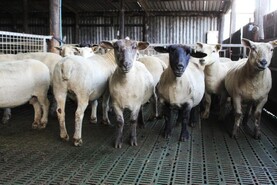As Christy Moore once sang, “Everybody needs a break”. Now that the Christmas period is upon us, there will hopefully be a chance to get a few days away from the farm, to spend time with the family, rest the body and mind as well as taking time to enjoy yourself.
It has been a tough year in farming, so time away from the usual day-to-day routine will help refresh and re-invigorate you.
While there will have to be some daily chores to carry out, there is much that can be done to cut down on the amount of time required tending to livestock over Christmas.
Outlined are five steps to help set the farm up to give everyone a break over Christmas.
1 Double up on the silage allocation
On Christmas Eve, double up on the silage feeding by putting in a two-day feed. If possible, put in enough silage to last for three days by filling the passage.
This means all that needs to be done on Christmas morning, and St Stephen’s Day, is to push in fodder.
If cattle are fed through a feeder wagon, put in a double feed on Christmas Eve and fill the wagon again so that it’s ready to go when needed.
2 Clean out straw bedding
Where cattle are bedded on straw, make a point to clean out the shed the day before Christmas Eve. Once the shed has been cleaned out, apply double the normal straw content.
As the shed floor is clean and dry, the straw bed will last a few extra days giving you a break from Christmas Eve to the day after St Stephen’s Day.
3 Fill meal buckets in advance
If cattle are being fed concentrates daily, can daily meal allocations be made up in advance of Christmas Eve?
Fill as many buckets and bags as required and store them close to the cattle shed, ready to be used. Cover buckets by stacking and place a lid on the top bucket to keep vermin and birds out of the feed.
4 Make use of family help
Many hands make light work. Most Irish farms are family units, and with children on school holidays or home from college, ask for help to complete the chores which have to be carried out every day, eg meal feeding or feeding calves on milk.
Ask children what are their plans, so there are no crossed wires about the availability of help. Having additional family help during the Christmas period is a good time to carry out a few bigger tasks, eg de-horning late autumn and winter-born calves, castrating calves, clipping cattle, weighing animals etc.
Where family labour is available, try and give everyone a break. Can a rota be drawn up for the Christmas period?
The rota can cover the three days from Christmas Eve to St Stephen’s Day, or even better, the full week to New Year’s day.
For example, does it suit to alternate working days, or work two days on, followed by two days off from the bigger tasks.
Planning out what tasks have to be done, and what tasks can be delayed for a few days, means everyone can have a break over Christmas, but the core jobs still get done.
Finally, on behalf of the Irish Farmers Journal livestock team, I would like to wish you a merry Christmas and a prosperous, and safe year of farming in 2020.
Read more
Animal dosing products to require prescription from 2022
Monday management: time for pre-calving minerals
As Christy Moore once sang, “Everybody needs a break”. Now that the Christmas period is upon us, there will hopefully be a chance to get a few days away from the farm, to spend time with the family, rest the body and mind as well as taking time to enjoy yourself.
It has been a tough year in farming, so time away from the usual day-to-day routine will help refresh and re-invigorate you.
While there will have to be some daily chores to carry out, there is much that can be done to cut down on the amount of time required tending to livestock over Christmas.
Outlined are five steps to help set the farm up to give everyone a break over Christmas.
1 Double up on the silage allocation
On Christmas Eve, double up on the silage feeding by putting in a two-day feed. If possible, put in enough silage to last for three days by filling the passage.
This means all that needs to be done on Christmas morning, and St Stephen’s Day, is to push in fodder.
If cattle are fed through a feeder wagon, put in a double feed on Christmas Eve and fill the wagon again so that it’s ready to go when needed.
2 Clean out straw bedding
Where cattle are bedded on straw, make a point to clean out the shed the day before Christmas Eve. Once the shed has been cleaned out, apply double the normal straw content.
As the shed floor is clean and dry, the straw bed will last a few extra days giving you a break from Christmas Eve to the day after St Stephen’s Day.
3 Fill meal buckets in advance
If cattle are being fed concentrates daily, can daily meal allocations be made up in advance of Christmas Eve?
Fill as many buckets and bags as required and store them close to the cattle shed, ready to be used. Cover buckets by stacking and place a lid on the top bucket to keep vermin and birds out of the feed.
4 Make use of family help
Many hands make light work. Most Irish farms are family units, and with children on school holidays or home from college, ask for help to complete the chores which have to be carried out every day, eg meal feeding or feeding calves on milk.
Ask children what are their plans, so there are no crossed wires about the availability of help. Having additional family help during the Christmas period is a good time to carry out a few bigger tasks, eg de-horning late autumn and winter-born calves, castrating calves, clipping cattle, weighing animals etc.
Where family labour is available, try and give everyone a break. Can a rota be drawn up for the Christmas period?
The rota can cover the three days from Christmas Eve to St Stephen’s Day, or even better, the full week to New Year’s day.
For example, does it suit to alternate working days, or work two days on, followed by two days off from the bigger tasks.
Planning out what tasks have to be done, and what tasks can be delayed for a few days, means everyone can have a break over Christmas, but the core jobs still get done.
Finally, on behalf of the Irish Farmers Journal livestock team, I would like to wish you a merry Christmas and a prosperous, and safe year of farming in 2020.
Read more
Animal dosing products to require prescription from 2022
Monday management: time for pre-calving minerals






 This is a subscriber-only article
This is a subscriber-only article










SHARING OPTIONS: